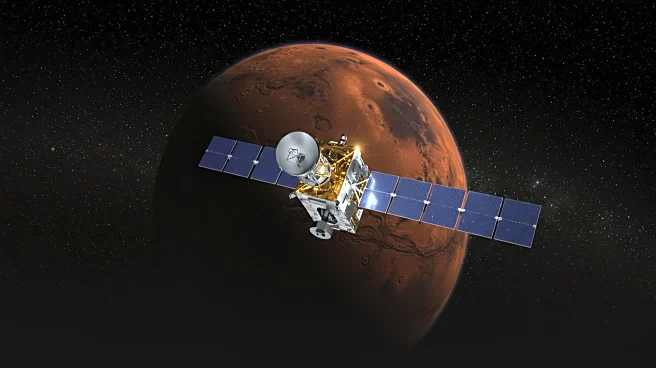What is the story about?
What's Happening?
Lockheed Martin is actively developing options to support NASA's next generation of Mars communications capabilities. This initiative is part of a broader commercial race to establish infrastructure for Mars exploration, driven by a policy bill signed into law by President Trump. The bill allocates $700 million for NASA to hire a company to build a Mars telecommunications orbiter (MTO) by 2028. Lockheed Martin, along with other companies like Rocket Lab and Blue Origin, received funding for Mars Sample Return (MSR) studies last year. These companies are exploring solutions to provide communications for Mars missions, including returning samples and supporting future crewed and robotic missions. Lockheed Martin's extensive experience in Mars missions positions it as a strong contender in this competitive field.
Why It's Important?
The development of Mars communications infrastructure is crucial for future exploration and potential colonization efforts. Lockheed Martin's involvement highlights the growing role of private companies in space exploration, traditionally dominated by government agencies. This shift could lead to more efficient and cost-effective solutions, as companies leverage their expertise and resources. The competition among companies like Lockheed Martin, Rocket Lab, and Blue Origin could accelerate technological advancements and reduce costs, benefiting NASA and other stakeholders. The successful implementation of these projects could enhance the U.S.'s leadership in space exploration and foster international collaborations.
What's Next?
NASA is expected to select a contractor for the Mars telecommunications orbiter by fiscal year 2026, with delivery by 2028. Companies involved in the MSR studies will continue to refine their proposals and technologies to meet NASA's requirements. The competitive landscape may lead to strategic partnerships or mergers among space companies to strengthen their offerings. As the deadline approaches, stakeholders will closely monitor developments and potential policy changes that could impact funding and project timelines.
Beyond the Headlines
The push for Mars exploration raises ethical and environmental considerations, such as the impact of human activities on the Martian ecosystem. The involvement of private companies introduces new dynamics in space governance, potentially influencing regulatory frameworks and international agreements. Long-term, successful Mars missions could pave the way for commercial ventures, such as resource extraction and tourism, transforming the space economy.
















